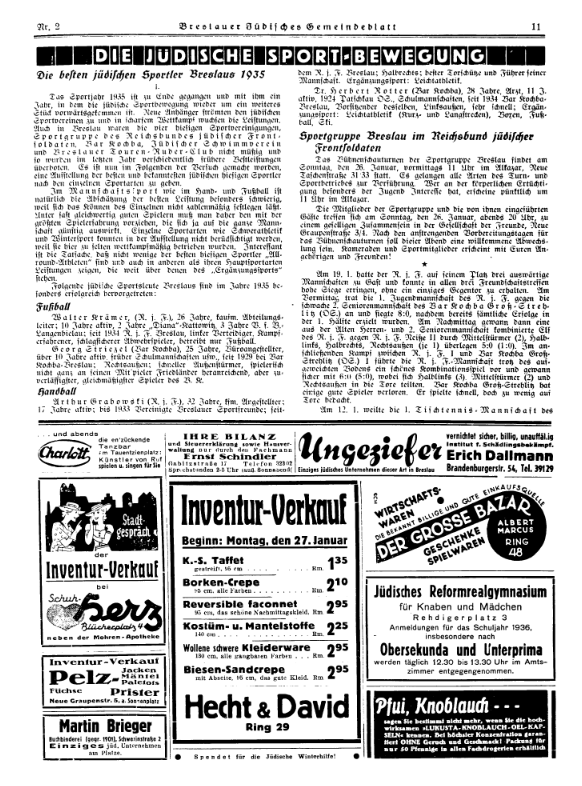Jewish Football Clubs in Breslau During the Interwar Period
27/01/2023 - 4.06
Dawid Kaczmarski
On Sunday, the 28th of August 1938, Sportplatz Krietern in Breslau (today Wroclaw, Poland) saw three football matches between the local Jewish clubs – Schild and Bar Kochba. Both of them ceased to exist in the aftermath of the Kristallnacht later that year. Their histories, glimpses of which can be found in the interwar press, exemplify the diversity of the Jewish approaches to those turbulent times. Their fate can be also treated as a chronicle of events leading to the tragedy of Shoah.
Sportplatz Krietern on a 1933 city map published by August Scherl Deutsche Adreßbuch-Gesellschaft. Source: https://www.bibliotekacyfrowa.pl/dlibra/publication/33208/edition/41420
Founded in 1919, Reichsbund jüdischer Frontsoldaten (Reich Federation of Jewish Front-Line Soldiers) was a German-Jewish soldiers’ patriotic organisation. With its emphasis on commemorating the role of Jewish soldiers in the German Army in World War One, it was an answer to the growth of anti-Semitism in the post-war years. In 1924, RjF formed its sport branch, which from 1925 was known by the name of Schild (1). In February 1926, RjF started publishing accounts on its activities in Breslauer Jüdisches Gemeindeblatt – a press organ of the Jewish community in Breslau (2). Over the years, these reports would include brief coverages of local sport events, including football games.
While the clubs associated in Schild strove to emphasise their loyalty to the German state, Bar Kochba Breslau was a member of an organisation epitomising the Zionist movement – the Maccabi World Union (MWU). As a centralised and international association of Jewish clubs the MWU was only established in 1921, but its roots are typically linked with the speech delivered by Max Nordau at the Second Zionist Congress on the 28th of August 1898. Nordau, one of the leaders of the Zionist movement, inspired the growth of Jewish sport clubs by coining the term “Muscular Judaism”. On the territory of then-Germany, those clubs often took the name of Bar Kochba – after the first club set up in Berlin in the year of Nordau’s speech. Though initially not openly Zionist Bar Kochba Berlin did join Maccabi alongside a number of other clubs (3). According to Frankfurt’s Gemeindeblatt der Israelitischen Gemeinde, by the end of 1927, the German branch of Maccabi consisted of 25 clubs with Bar Kochba Breslau among the largest ones (4).
Both Schild and Maccabi experienced a most unlikely growth in memberships after 1933, when, as a result of NSDAP’s rise to power, Jews were beginning to be expelled from non-Jewish clubs. Jewish clubs as such, though de-facto forbidden to compete with their non-Jewish counterparts, were not banned before the Kristallnacht of 1938. With the Berlin Summer Olympic Games and the Winter Olympics in Garmisch-Partenkirchen on the horizon, the Nazi authorities were making some efforts to convince the international public that the Jews’ rights to the pursuit of sports activities were untouched (5) – just within a peculiar version of the “separate but equal” framework. The initial growth of Jewish clubs, then, was a direct consequence of the Jewish athletes being left with no other options (6). It turned out to be short-lived as the deterioration of the wider socio-political landscape stimulated mass emigration. In Breslau, two-thirds of the 30,000-strong Jewish community left the city between 1935 and 1938 (7).
The standards of football reporting in the German Jewish press of the 1930s may, from a contemporary perspective, seem low. Most reports lacked such basic information as the starting elevens. Nonetheless, even these rather terse sources allow us to learn something more about the most prominent figures of the clubs in question. In January 1936, for example, Breslauer Jüdisches Gemeindeblatt awarded the yearly title of the best player of the local branch of Schild to the left-back Walter Krämer. Aged 26, Krämer worked as a merchant and had played for Schild Breslau since 1934 (previously representing Diana Kattowitz and VfB Langenbielau). A similar title in Bar Kochba was awarded to Georg Striezel, a 25-year-old office clerk. Interestingly, the prize for the best handball player of Bar Kochba went to Herbert Rotter, who played for the club’s football section as well (8).
Best Jewish athletes in Breslau in 1935 according to Breslauer Jüdisches Gemeindeblatt. Source: http://www.bibliotekacyfrowa.pl
Schild and Maccabi alike organised countrywide championships for the clubs associated within the respective organisations (9). Much like the “Aryan” clubs from Breslau, the city’s Jewish teams were not top contenders in their respective competitions. In 1937, though, the local Schild team managed to reach the final, where it ended up being beaten 5:0 by Schild Stuttgart (10). Apart from the official competitions, the clubs were often involved in friendly games against each other.
The matches of late August 1938, took place on a pitch at Trentinstraße 61 (today Krzycka Street). It was sometimes referred to as Sportplatz Krietern – after the German name of the city district nowadays known as Krzyki. The weather that day, as reported a few days later in the press, was good for a game of football. The pitch was dry despite a rather rainy end of the month. The day started promising for Schild, whose boys team beat Bar Kochba 4:0. In the subsequent youth team clash, Bar Kochba outperformed Schild, leading 4:0 at half time and winning the whole game 7:3. Bar Kochba also won the game of the senior teams. The 2:1 result was reached before half time. Bar Kochba first capitalised on a mistake made by Schild’s goalkeeper before scoring another one from a free-kick and giving away half of their lead with an own goal. Zionist Judische Rundschau praised Bar Kochba’s defence as well as its new goalkeeper, Horts Schüftan. Other titles state that overall, the game was enjoyable to watch and fair (11). It’s hard to say how many spectators attended the games. In Breslau throughout the 1930s, the press reported both complaints about low levels of attendance and, in the case of the game between Schild Breslau and Schild Berlin, the need to install extra seats in Sportplatz Krietern (12).
On October 21, 1938, on the pages of Der Schild, the Reich Federation of Jewish Front-Line Soldiers congratulated Bar Kochba Berlin on the 40th anniversary of its establishment13. Less than three weeks later, the pogroms of the Night of Broken Glass ended Jewish sport in Breslau and the whole of Nazi Germany.
References
1. Pfister, G. Sports in Germany: 1898–1938, https://jwa.org/encyclopedia/article/sports-in-germany-1898-1938; Jewish Allstars, p. 36, http://juedische-sportstars.de/fileadmin/sportstars/download/Broschuere_JewishAllstars.pdf
2. Breslauer Jüdisches Gemeindeblatt, 1926, 18 February, p. 22, http://www.bibliotekacyfrowa.pl/Content/55810
3. Śmiechowski, K., 2012, The Origins of the Maccabi World Union and the Maccabiah Games (1900 1939), [in:] The Maccabees of Sport. Jewish Sport in Kraków.
Krüger, A., 1999, “Once the Olympics are through, we’ll beat up the Jew” German Jewish Sport 1898-1938 and the Anti-Semitic Discourse, Journal of Sport History, 26(2), 365. https://www.yumpu.com/en/document/view/21167569/once-the-olympics-are-through-well-beat-up-the-jew
4. Gemeindeblatt der Isrealitischen Gemeinde Frankfurt am Main, Makkabi Weltverband, 1927, December, p. 93, https://sammlungen.ub.uni-frankfurt.de/cm/periodical/titleinfo/3094327
5. Jüdisch liberale Zeitung, 20 July 1934, Kein Rassenprinzip bei der Olympiade, https://sammlungen.ub.uni-frankfurt.de/cm/periodical/titleinfo/2613366
6. Krüger, A., 1999, “Once the Olympics are through, we’ll beat up the Jew” German Jewish Sport 1898-1938 and the Anti-Semitic Discourse. Journal of Sport History, 26(2), pp. 353-375. https://www.yumpu.com/en/document/view/21167569/once-the-olympics-are-through-well-beat-up-the-jew
7. Davies, N., Moorhouse, R., 2011, Mikrokosmos: pp. 394–403
8. Breslauer Jüdisches Gemeindeblatt,1936, 31 January, p. 11, http://www.bibliotekacyfrowa.pl/Content/55949
9. https://www.rsssf.org/tablesd/duitmakkabischildchamp.html
10. Der Schild: Zeitschrift des Reichsbundes Jüdischer Frontsoldaten, 1937, 17 September, Schild Stuttgart bleibt Fußball-Meister. p. 5, https://sammlungen.ub.uni-frankfurt.de/cm/periodical/titleinfo/5449701
11. Der Schild, 1938, 2 September, Wieder ein Derby in Breslau, https://sammlungen.ub.uni-frankfurt.de/cm/periodical/titleinfo/5449808; Jüdische Rundschau : allgemeine jüdische Zeitung, 1938, 2 September, p. 6, Fuβball in Breslau, https://sammlungen.ub.uni-frankfurt.de/cm/periodical/titleinfo/2653608; Jüdisches Gemeindeblatt für die Synagogen Gemeinde Breslau, 25 September, 1938, p. 8, Fuβball auf dem Sportplatz Trentinstraβe, https://www.bibliotekacyfrowa.pl/dlibra/publication/56029/edition/56010/content
12. Breslauer Jüdisches Gemeindeblatt, 1934, 29 June, p. 10, http://www.bibliotekacyfrowa.pl/Content/55908/PDF/directory.pdf
13. Der Schild, 1938, 21 October, Schild gratuliert Makkabi, p. 5, https://sammlungen.ub.uni-frankfurt.de/cm/periodical/titleinfo/5448600
Biography
Dawid is a freelance journalist based in Wrocław. His interests include Sport and Society, The History of Sport, as well as being an avid Liverpool Fc Fan – YNWA!



/prod01/wlvacuk/media/departments/digital-content-and-communications/images-2024/240328-Varsity-Line-Up-Resized.jpg)
/prod01/wlvacuk/media/departments/digital-content-and-communications/images-18-19/220325-Engineers_teach_thumbail.jpg)
/prod01/wlvacuk/media/departments/digital-content-and-communications/images-2024/240515-Spencer-Jones-Award-Resized.jpg)
/prod01/wlvacuk/media/departments/digital-content-and-communications/images-2024/240320-Uzbekistan-Resized.jpg)
/prod01/wlvacuk/media/departments/digital-content-and-communications/images-2024/240229-The-Link-Resized.jpg)
/prod01/wlvacuk/media/departments/digital-content-and-communications/images-2024/240516-Andy-Gibson-Resized.jpg)
-620x279.PNG)
